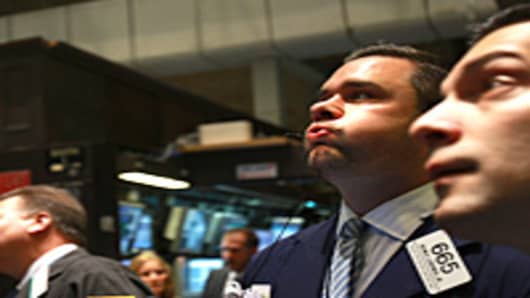There was a selloff in Asian stocks on Friday with Japan's Nikkei falling more than 2 percent and Korea's Kospi, which has been highly volatile to recent market swings, dropping 6 percent. That followed another startling session on U.S markets, with the Dow dropping 3.7 percent and the S&P down 4.5 percent on growing worries about euro zone banks.
“Every morning the investors come in, and they see the credit default swaps on European bonds widening,” Jason Ader, Ader Investment Management told CNBC, “And the headlines haven’t been great, and political noise both in the U.S. and Europe is worrisome. And so it’s creating anxiety — it also creates opportunity as well."
The selloff was triggered by a Wall Street Journal report that the New York Federal Reserve was intensifying scrutiny of Europe's largest banks. A jump in weekly jobless claims and the fact that Morgan Stanley cut its global growth forecast added to the gloom.
“The question is do we go into recession or not and I don’t think that question has been answered,” Dodge Dorland, Chief Investment Officer at Landor and Fuest Capital Managers told CNBC. “We’re trying to find a bottom now, it will be a very short-term bottom, I think there will be a move to the upside, potentially not a move for the long term, but a move to line up positions.”
Many investors are finding shelter in gold and bonds, with gold continuing to hit record highs, and the yield on 10 year U.S. Treasurys falling below 2 percent for the first time.
But Ader says it’s hard for him to justify putting money into gold at current levels. Instead, he’s looking at companies with solid fundamentals, mixed with some short plays.
“I would be a long investor for companies that have very, very strong balance sheets, that have net cash, that don’t have debt, that have the ability to use their cash to buy distressed competitors,” said Ader. “But I’m also an active short seller and have been finding opportunities around the financials, and around industrial companies, and I’ve been a fairly big short seller in the Chinese market, as it looks like things there are clearly slowing.”
“We have small positions in gold,” said Dorland. “But there are so many companies that are fundamentally strong. It’s a matter of timing. So we’re trying to reduce our long positions in our portfolios, we’re also active short-sellers – we do hedge our positions and we think there’s more of a hedging opportunity right now.”


